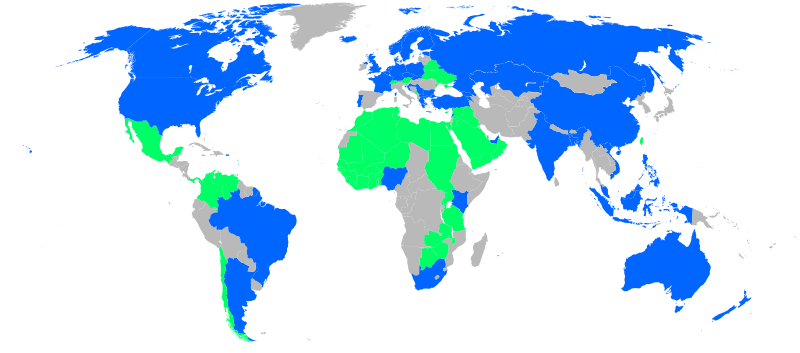Japanese Music Contest’s Challenge to Existing Institutions Compared With Arab Spring and the Theory That Music Elections Aid Democratization Movement
As most people around the world already know, televised contests for musicians have become an international sensation, especially for young people. The roots of these contests go back at least to the 1950’s when Eurovision was created. The modern craze started in England in the form of a hit series Pop Idol, that was copied in the US from where the format spread like wildfire. Wikipedia has a list showing the variety and diversity of the shows that are currently running across the world:
American Idol, Arab Idol, Australian Idol, Latin American Idol, Idols (Denmark, Netherlands, Finland, South Africa, West Africa, Serbia-Montenegro & Macedonia), Idool (Belgium), Canadian Idol, Indian Idol, Indonesian Idol, New Zealand Idol, Hay Superstar (Armenia), Idol stjörnuleit (Iceland), Pinoy Idol (Philippines), Idol (Sweden), Idol (Norway), Idol (Poland), Nouvelle Star (France), Deutschland sucht den Superstar (Germany), Singapore Idol, Malaysian Idol, Vietnam Idol, Music Idol (Bulgaria), Ídolos (Brazil and Portugal), Greek Idol, Super Star (Arab States), Hrvatska traži zvijezdu (Croatia), SuperStar KZ (Kazakhstan), Eesti otsib superstaari (Estonia), Slovensko hľadá SuperStar (Slovakia), Macedonian Idol and Kokhav Nolad (Israel).

The relevance of these contests to democracy is in their strange relationship to the democratic waves spreading concurrently across the world from Russia to the Arab Spring. Many of the contests, including American Idol and Eurovision, feature massive telephone-based elections for contest winners. Some of these elections have been absolutely enormous. 750 million votes were recorded in American Idol’s tenth season. Explain that to Thomas Jefferson.
Can Music Elections Aid the Democratization Movement?
Yet, what are the ramifications of these massive elections on the youth and on society at large? An interesting perspective comes from election experts who use American Idol votes as a testing ground for different counting methodologies and vote prediction tools. One of Democracy Chronicles own writers, Richard Fobes, author of the book, “Ending The Hidden Unfairness In U.S. Elections” about election method reform in the US government, also runs a website, Votefair, where he uses American Idol voting statistics to test vitally important theories of election methodology and vote counting. There is even a website called Idol Analytics dedicated to the study of American Idol election statistics.
While these projects reflect the academic uses of the Idol elections, there is also wide repercussions from such shows concerning the spread of democratic systems into public life. Across the world, these elections are closely watched by millions of young people who are undeniably being exposed to essentially free and fair elections on at least a basic level. At a time when democracy is under attack in the US and around the world, millions of young people, many to young to vote for government, are voting and following the developments closely.

The political history of the Eurovision contest is further proof that these elections are not separate from the battle for democracy worldwide. According to thier website, Eurovision is one of the longest-running television programs in the world and also one of the most watched non-sporting events in the world with audience figures having been quoted in recent years as anything between 100 million and 600 million internationally.
The map of participant countries in Eurovision is perhaps the most generously inclusive map of Europe’s borders that exists including Turkey, Russia and even Morocco (see map). Political rows between Israel and Lebanon have made headlines along with controversies over expatriate voting and minorities. Recently the dictatorship of Azerbaijan saw some of its first democracy protests in years as a response to the attention brought by the Eurovision contest.
In Japan, the effect that the contests have had are undeniably politically relevant. “It may sound wild, but the movement is comparable to the Arab Spring,” a Japanese media commentator told AFP. The Japanese contests have provided a forum where the youth can act in unison and without the influence of the country’s aging leadership. Take a look at this article from AFP. It really makes one think about the ridiculous nature of the world around us but also reaffirms the utility of the election process for decision-making among millions of people. Here it is:
Japan pop fans go crazy for democracy
TOKYO – The election debate that raged across Japan for weeks has been settled, campaigners are packing up their things and TV pundits are moving on to different topics – all-girl group AKB48 has a new president. Pictures of teary-eyed 23-year-old Yuko Oshima dominated Thursday’s newspapers after her victory in a popular ballot for the top spot in one of the world’s highest grossing acts. Anyone was allowed to vote in the election – as long as they bought a copy of AKB48′s most recent single “Manatsu no Sounds Good!” (a mixture of Japanese and English that defies sensible translation, but has something to do with summer).
Read more: https://entertainment.inquirer.net/44191/japan-pop-fans-go-crazy-for-democracy#ixzz3AL01pRT9
Follow us: @inquirerdotnet on Twitter | inquirerdotnet on Facebook
So Yes, Music Elections Aid Democratization.
Leave a Reply